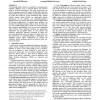Free Online Productivity Tools
i2Speak
i2Symbol
i2OCR
iTex2Img
iWeb2Print
iWeb2Shot
i2Type
iPdf2Split
iPdf2Merge
i2Bopomofo
i2Arabic
i2Style
i2Image
i2PDF
iLatex2Rtf
Sci2ools
110
Voted
ICCAD
2009
IEEE
2009
IEEE
Operating system scheduling for efficient online self-test in robust systems
Very thorough online self-test is essential for overcoming major reliability challenges such as early-life failures and transistor aging in advanced technologies. This paper demonstrates the need for operating system (OS) support to efficiently orchestrate online self-test in future robust systems. Experimental data from an actual dual quad-core system demonstrate that, without software support, online self-test can significantly degrade performance of soft real-time and computation-intensive applications (by up to 190%), and can result in perceptible delays for interactive applications. To mitigate these problems, we develop OS scheduling techniques that are aware of online selftest, and schedule/migrate tasks in multi-core systems by taking into account the unavailability of one or more cores undergoing online self-test. These techniques eliminate any performance degradation and perceptible delays in soft real-time and interactive applications (otherwise introduced by online selftes...
Related Content
| Added | 18 Feb 2011 |
| Updated | 18 Feb 2011 |
| Type | Journal |
| Year | 2009 |
| Where | ICCAD |
| Authors | Yanjing Li, Onur Mutlu, Subhasish Mitra |
Comments (0)

